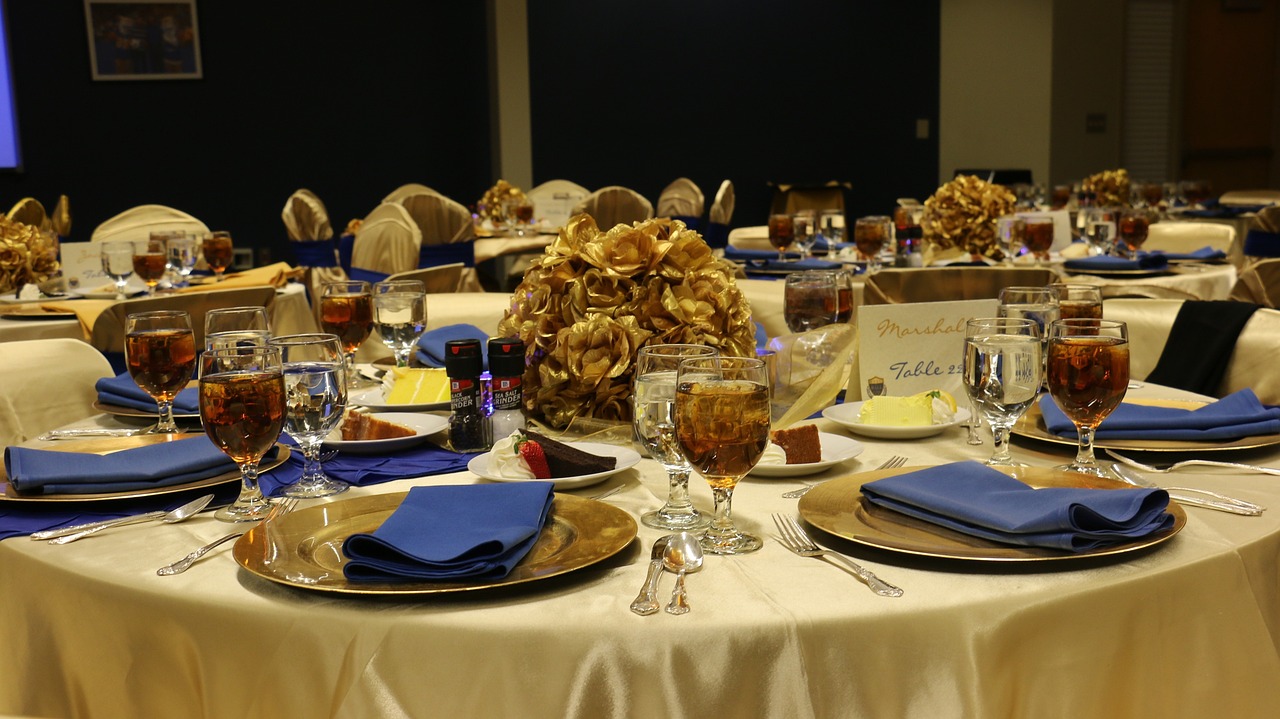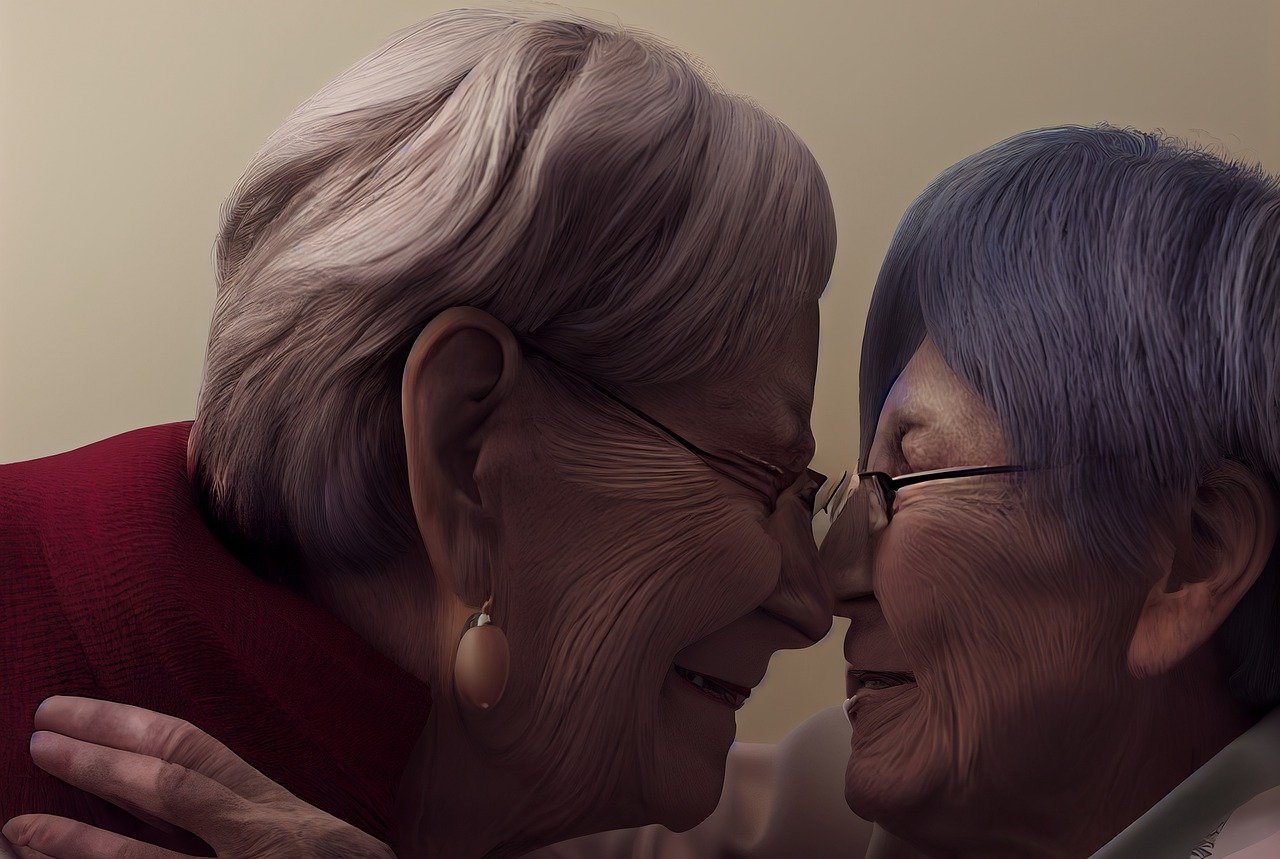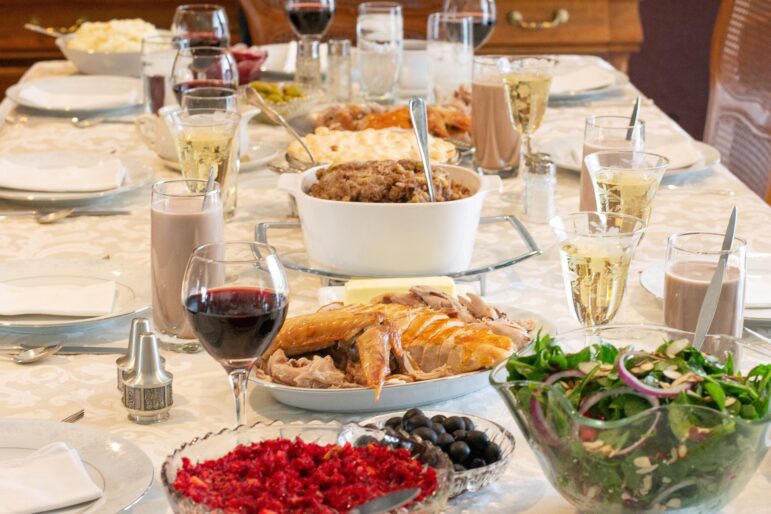
As soon as the sabbat of Pomonalia (the Rite of Hecatia) has completed, I eagerly await my favorite yearly holiday: Thanksgiving. It is the one time of the year when we can gather with complete strangers, regardless of religious or cultural background, and enjoy each other’s company. Some of my wackiest family adventures came on Thanksgiving, such as not wanting to buy and prepare a 15-pound turkey, so I stopped at the local Meijer’s for plump turkey sandwiches. It was one of the best celebrations of Thanksgiving ever, as what mattered was the company, not the formal preparation.
Years later, while I was caring for my mother, who would eventually die from a form of Parkinson’s, I had the pleasure and privilege to meet others who shared similar duties at an annual luncheon during the month of November given by the Struthers Parkinson Center in celebration of National Caregiving Month. It looked like the setup below.

Luncheon – (Pixabay)
My work duties meant that I rarely was able to make the actual luncheon most years; however, on one year when I did attend, I was struck by several realities.
First, roughly 80% of the attendees were women whose male spouses or partners were affected by some form of Parkinson’s disease or a type of Parkinsonism. The remainder were men caring for female spouses or partners, or relatives who cared for parents or siblings. A few were friends caring for other friends. I was probably the youngest person in the room by far, as many caregivers were retired or had entered a type of caregiving forced retirement. Having a luncheon permitted those with respite care options to have fun for a few hours and to engage in growing a supportive community of caregivers.
Second, the lunch functioned as celebration of the task so many do without pay and with little acknowledgement from many on the outside. This is the reality of caregiving. We experience it as child-recipients from our parents or those who raise us. At some point, we can reciprocate with those in our lives – either willingly or unwillingly through the force of nature and time.
Finally, the presenters and fellow attendees were also a release valve for the many hidden and often unspoken traumas and pain that afflict the caregiver. Among the free brochures were some items, musical collections, and books to help remind those who walk this path that they are not alone, even when it seems like no one understands or is aware of their plight. Caregiving is an isolating experience.
It is not the one who suffers the illness, but the one who cares for patient who needs self-care to stay sane. I sat at a table where I learned more in an hour about how to cope with my mother’s needs as well as my own needs than I had from numerous sessions with physicians, therapists, and other medical personnel over several years.

Caregiving (Pixabay)
Perhaps it is how we approach illness and caregiving in contemporary Western society. My hairdresser from Togo assured me repeatedly that I must be African because I chose to care for my mother in my home instead of placing her in a facility. She had noted how so many of the elderly who needed care in the United States lived in nursing homes or assisted living when in her culture, the norm was to have the family care directly for the elderly or to assist in bringing care to the loved one’s home.
Sadly, for many, this is not possible or realistic. Too often, society is quick to admonish or rebuke those whose circumstances force the loved one into a facility rather than into care of family members.
The welcome fantasy often goes as follows: old age will be just like in the best of movies with the loved one surrounded by adoring family, residing in a good living environment, receiving sufficient and competent medical care, and somehow having enough money to pay for all of this. Given the statistics from the National Council on Aging per month at $4500 for assisted living, $6160 for memory care for Alzheimer’s Disease patients, and $9034 for single room nursing home care, the average family salary means making a choice most cannot afford.
If you are a queer or trans recipient who needs care but who doesn’t have the money for the care or have a good enough relationship with your family, then you definitely cannot afford the fantasy.

Queer couple – enjoying life (Pixabay)
Financially, it is difficult to provide the care even with government or private assistance that most individuals need. From years of filling out forms for Medicare and Medicaid, it appeared that both required near destitution to qualify for many options. In addition, a tolerance for never-ending paperwork helps to survive the caregiving journey.
For many, the coordination needed with just family providing care means sacrifice. In today’s world, even post-COVID, how many of us have the time to re-arrange a schedule around making someone who is suffering the focus of our days, weeks, months, and perhaps years? It is far from glamorous, nor is it celebrated enough in this country.
It is common to lose those once considered friends, and even emotional connections with those who are family may be strained due to the highly challenging nature of caregiving. At the luncheon that November day, I often heard what I did not want to accept for myself: some people just can’t deal. This does not make them bad people or even poor examples of humanity.
I used to resent other family members or friends during the most intense caregiving times saying “I don’t know how you do it” by filling in the blank to what appeared to be the probable meaning: “I couldn’t do it” or just a plain “I wouldn’t do it”.
Now, I admire what was hard to see before: sometimes “could not” or “would not” was just plan fear.
We know that death awaits us, and we don’t want to screw up someone else’s life.
Indeed, in this country, we are taught that a good person should not be a “burden.” Now, when I hear someone who is ill saying that I believe them and understand a bit more as to why one might wish to hide a serious diagnosis from all but a few precious friends or family members. It is not just the physical needs of the person who is ill or dying, it is the emotional impact on those who are giving care or those who have known the ill or dying person.
Recently, I caught an interview with noted publicist and new author Mary Lou Falcone about the art of caregiving and the reality of dealing with another type of disease closely that overlaps with Parkinsonism: Lewy Body Dementia. In her work, I Didn’t See It Coming: Scenes of Love, Loss, and Lewy Body Dementia, and her subsequent local interviews, she notes some of the lessons she learned. Hearing her speak reminded me of the many commonalities that I and so many caregivers often experience.
One of the first sad truths is how this valuable skillset often is taken for granted, and rarely is there a preparatory course in how to manage the very real-life issues that occur during the process.
In fact, being unable or unwilling to face the mortality of another person is perhaps the ultimate tribute to being human. If we are not able or willing to face our own eventual death, how can we eagerly assist and help with those who are going through the process of illness that will probably lead to death at some point.
Our society does not prepare us for this type of reality except for the common notion that when one is at that stage, our world will consist of garish hospital lighting and medical staff. Perhaps if one is extremely lucky, enough loved ones will care or arrange care in the comfort of home for the loved one.
Because we do not speak frequently about the preparation needed for dying, we hide it, like the presents for a child’s birthday that are covered up in a coat closet, an attic, or in the back of a basement.
Like an obstetrician caring for a pregnant woman, there are always two clients in caregiving: the actual loved one who is ill and the caregiver. We are not robots. One of the hardest lessons to learn during the time I cared for my mother was to take care of myself by learning how to say “no” and when to say “yes.”
For foster parents, the organization arranging for the foster care can offer respite. During hospice, such offers vary widely depending on program. Our program offered four hours a week. It was meant to be enough to have time away from your loved one to go shopping for groceries or maybe catch a movie if it was nearby. I was fortunate to have a large separate freezer that I would stock throughout the year to use those four-hour spans to just breathe.
As humans, we know on an intellectual level that when make a mistake with a pen or pencil, then we can erase and start over. If we scuff a wall, we can prep it and paint over with a fresh coat.
Screwing up someone’s life is not that simple. I was terrified to make a mistake with my mother’s life. The sad truth is that we are brought into this world through unseen hands. We have no control over the humans who usher us into consciousness, nor the steps our parents or other adults take in their care of us from infancy through late adolescence.
We enter adulthood assured that we have the tools to live our lives. When it comes to dying, if we are fortunate, then we will have some decision with our health care directives as to our comfort level when we leave this planet.
When it came time to call for the hospice evaluation team, I questioned if I was doing the right thing at the right time. Was it too soon? Was it too late? Our ability as humans to cope with an end that will surely come for us all is scary. We are only given one life, so if we are not sure of our own abilities to cope with the needs of the ill or dying, then we turn over the tasks to others.
My mother often reminded me to watch the wheels of a car. Our focus drives the car.
Short of physical deficits, as humans, we are capable of love and care for each other. It is how our species has survived for so long. If a sane rational adult sees a child in need, it is a normal response to try to help the child. I do not speak of those who are mentally unbalanced or who have issues where we would not place a child or vulnerable adult in that person’s care.
Our current society, however, does not fully embrace this ideal. To support the young and their offspring, in fact to even encourage the future of our species, society encourages the drive to make a career, to purchase or find desirable living spaces, possibly to nurture and grow a family, but most of all, to make money. The expenditure for these four areas does not leave room for those entering the end of the scale of life or those who live under a serious illness. Anything that draws the active individual away from these four areas is suspect, and hence discouraged. Even those who care for our loved ones in assisted living or nursing homes are paid so poorly that excellence is rarely rewarded on a monetary level.
The caregiver’s lunch brought solace because of the reality that so many experience: caregiving is often lonely, unrewarding, and desolate life. As caregiver, you provide emotional, physical, mental, and psychological support for your loved one. The one who is dying has enough on their hands: they may not be able to return any of the support given to them, and to be honest, why should they? Death, dying, and just stepping onto the path through extreme illness is hard. Full stop.

Path to the Underworld [Pixabay]
When caring for someone on the death and dying path, the caregiver also experiences loss, and I don’t just mean anticipatory grief before the loved one dies. There is the loss of time, of sleep, of friends, of experiences that others take for granted. The weight and burden of what is to come as an illness progresses or nears its end is immeasurable. Days of tears and heartache alternate with whispers of gratitude that there even remains time to share with the loved one. Too often, it is only after death that relatives or friends of the deceased remember something that they wished had been said while the loved one was alive. I have few pictures of those years, but the ones I do are consumed by taking care of my mother’s needs and making sure that her exit was as peaceful as it could be.
The path of the caregiver winds through the underworld for many, into a land of mysteries, joys that rise unbidden to the top of the glass filled with nourishment that you do not know you need until you are at a pause in need of a drink and some food.

Thanksgiving Dinner! [Pixabay]
During this month, I give gratitude for the experience of caregiving and the many lessons of tolerance, love, and compassion that it has taught me. For the many caregivers whether paid in love, in dollars, or in wisdom, I salute you. We each shall pass through the veil of time at the end of our lives. We each shall need someone else to honor our being and existence as we pass from this world. We each shall need the compassion, assistance, and love that our caregiving humans bring to the table in act, word, and deed.
If you are a caregiver, take a few minutes to bask in the knowledge that you are known, you are seen, and you are appreciated.
If you are the one receiving the care, please know that your presence is a blessing and an honor.
Finally, if you are seeing that door of caregiving before you, please do not be afraid. There are so many more of us who are ready to welcome you for what you do. Do not forget to care for yourself daily. It means more than you will ever know for the persons receiving your care, and most importantly, for you.
Happy Thanksgiving!
The Wild Hunt is not responsible for links to external content.
To join a conversation on this post:
Visit our The Wild Hunt subreddit! Point your favorite browser to https://www.reddit.com/r/The_Wild_Hunt_News/, then click “JOIN”. Make sure to click the bell, too, to be notified of new articles posted to our subreddit.
